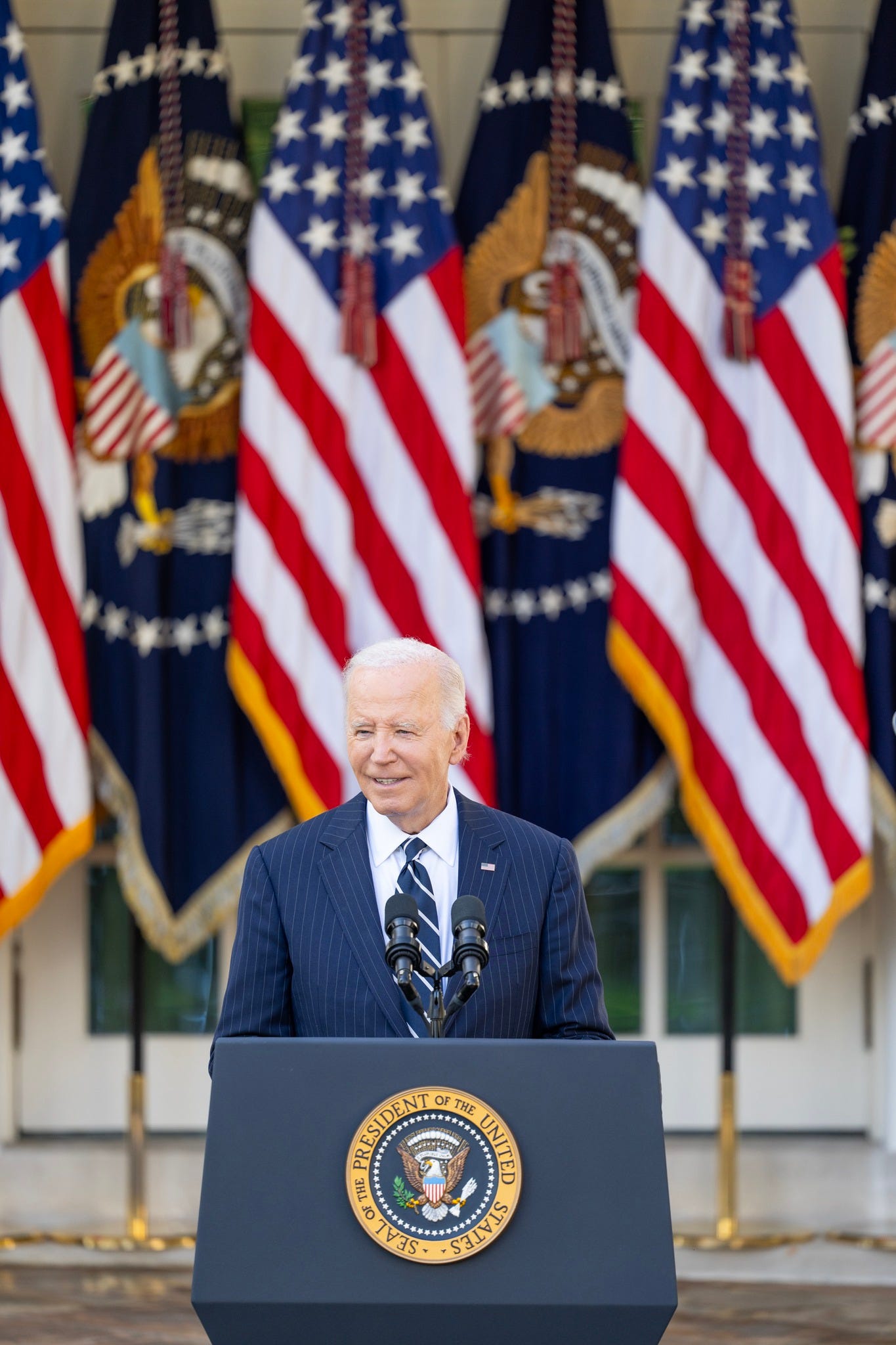In his address from the White House Rose Garden, President Biden reflected on the long-standing tradition of peaceful transfers of power, calling it a cornerstone of American democracy. He underscored that for over 200 years, the United States has upheld the democratic principle that the will of the people prevails, no matter the election outcome. He acknowledged that while elections are a contest of differing visions, the country's strength lies in respecting and accepting the choices made by the people. Biden noted that this commitment to democracy means supporting elected leaders regardless of personal political beliefs. To demonstrate this, he said he had called President-elect Trump to congratulate him. He assured his administration would work closely with Trump’s team to ensure a seamless transition. He extended this commitment to Vice President Harris, commending her for her tenacity, character, and the values she brought to her campaign.
Biden used the address as an opportunity to address the deeply polarized state of the nation, encouraging Americans to view each other not as opponents but as fellow citizens with shared values. He hoped people could “bring down the temperature” in political discourse and emphasized the need to see beyond divisive issues. He acknowledged the lingering questions around the integrity of the electoral process, affirming that the U.S. system is fair, transparent, and trustworthy, urging Americans to respect and appreciate the dedication of election workers who had volunteered and worked diligently to maintain election security and transparency.
Reflecting on his administration’s accomplishments, Biden took pride in what he described as a presidency for all Americans, highlighting achievements like infrastructure investments that he expects to transform struggling communities in urban and rural areas. He acknowledged that while some benefits are already being felt, the true impact of his administration's work, particularly the infrastructure initiatives, will unfold over the coming years. Despite the challenges, Biden remained optimistic about the future, asserting that his administration had fundamentally changed America. He encouraged his staff to stay focused on the remaining days of the term, to “make every day count,” and to finish strong.
As he closed, Biden acknowledged the inevitable setbacks in any endeavor, encouraging Americans not to give up despite adversity. He emphasized resilience, a value instilled in him by his father, saying that while defeat may be momentary, the spirit of perseverance defines American character. In his final words, Biden encouraged Americans to keep faith in the nation and its future. He expressed his pride in his team and thanked them for their dedication, closing with blessings for America and a call for God to protect U.S. troops.
President Biden reaffirmed the continuation of a national emergency declared in Executive Order 13959, originally issued on November 12, 2020, to address threats posed by investments in certain companies in China linked to the Chinese military and intelligence sectors. The order aimed to prevent U.S. capital from supporting Chinese companies involved in military and security operations, particularly under China’s Military-Civil Fusion strategy. Subsequent amendments, including Executive Order 14032, signed on June 3, 2021, broadened the scope to address threats from Chinese surveillance technology associated with human rights abuses and added restrictions on investments in companies connected to the Chinese military-industrial complex.
President Biden’s latest notice extended this national emergency beyond November 12, 2024, for one more year to mitigate ongoing risks to U.S. national security, foreign policy, and economy. This extension was scheduled for publication in the Federal Register and submission to Congress.
President Biden, under his authority and based on reports from the Energy Information Administration and other economic factors, has determined a sufficient global supply of petroleum from sources other than Iran. This supply allows for a significant reduction in petroleum purchases from Iran through foreign financial institutions, aligning with Section 1245 of the National Defense Authorization Act for FY 2012. The Secretary of State is instructed to publish this determination in the Federal Register, and the situation will continue to be monitored closely.
President Biden has issued a notice to extend the national emergency initially declared on November 14, 1994, by Executive Order 12938. This emergency was established to address the significant threat posed by the spread of nuclear, biological, and chemical weapons (weapons of mass destruction) and their delivery systems to U.S. national security, foreign policy, and economic stability. The order was amended in 1998 and 2005 to strengthen the U.S. response to this threat. The proliferation of these weapons remains a critical concern, necessitating the continuation of the national emergency beyond November 14, 2024, for another year. This notice will be published in the Federal Register and sent to Congress.
President Biden held a call with Brazilian President Luiz Inácio Lula da Silva, focusing on preparations for the upcoming G20 Summit set to take place in Rio de Janeiro. During the conversation, President Biden commended President Lula on Brazil’s achievements under its G20 presidency, highlighting efforts to improve workers' rights and combat hunger and poverty. These initiatives have been pivotal in addressing social inequalities, and Biden recognized Brazil's progress on these fronts. Additionally, Biden extended well wishes to President Lula for a swift and full recovery following a recent injury.
The discussion also underscored the importance of continued collaboration between the U.S. and Brazil on regional and global challenges. Both leaders affirmed their commitment to staying closely connected on these pressing issues, to foster stability and growth in the region and beyond. They expressed enthusiasm for meeting in person at the G20 Summit to further their dialogue and cooperative efforts.
President Biden will travel to Lima, Peru, from November 14-16 to strengthen U.S.-Peru relations and participate in the APEC summit, emphasizing U.S. economic influence in the Indo-Pacific. He will visit Manaus and Rio de Janeiro, Brazil, from November 17-19. In Manaus, Biden will meet with leaders focused on Amazon rainforest conservation, marking the first visit of a sitting U.S. President to the Amazon. In Rio, he will meet President Lula on the sidelines of the G20, promoting U.S. stances on workers' rights and sustainable growth. Biden will also address key global issues at the G20, including hunger, climate change, health, and debt relief for developing nations.
In today’s White House press briefing, Press Secretary Karine Jean-Pierre addressed the administration's response to the election results, focusing on the upcoming transition and President Biden's reflections on the outcome. She emphasized that President Biden had called President-elect Donald Trump to congratulate him and assure a smooth transfer of power, underscoring the administration’s commitment to a peaceful transition in line with democratic principles. Jean-Pierre acknowledged the administration’s disappointment, noting that while the result was not what they had hoped for, they respect the will of the American people. President Biden defended his decision to step aside in favor of Vice President Harris, believing it was in the country's best interest, despite criticism from some quarters. Jean-Pierre highlighted Biden's pride in key legislative achievements over his term, including economic measures, infrastructure investments, and healthcare reforms.
With 74 days remaining in office, the administration’s priorities include keeping the government functioning, delivering disaster relief, passing the National Defense Authorization Act (NDAA), and confirming judicial nominees. The President is focused on maintaining the progress made on the economy, healthcare, and climate policy, and Jean-Pierre reiterated Biden's commitment to leaving behind a strong economy. Regarding international relations, she addressed concerns about how global alliances might shift under Trump’s leadership. Still, she emphasized Biden’s ongoing commitment to NATO, Ukraine, and strategic partnerships in the Indo-Pacific region. She confirmed that the U.S. would continue its support for Ukraine and other diplomatic efforts until the end of Biden’s term.
Domestically, Jean-Pierre responded to questions about civil rights concerns under a Trump administration, affirming the Biden administration’s commitment to supporting vulnerable communities. She didn’t provide specific new policies but emphasized the need for unity and respect across differing viewpoints. Addressing Republican challenges to laws like the Inflation Reduction Act, she noted the administration’s confidence in the popularity and success of these policies, especially those related to climate change and healthcare.
Jean-Pierre also highlighted that Biden remains optimistic about America’s resilience, believing that the democratic process will continue to uphold the nation’s values. She underscored his pride in the strong economy and stable foundation he believes he is leaving behind for the next administration. In closing, Jean-Pierre reiterated that the administration is dedicated to an orderly transition of power, committed to the principles of democracy, and will continue working on behalf of all Americans during this period of change.
President Biden, speaking from the Rose Garden at the White House, addresses the nation about the peaceful transition of power





